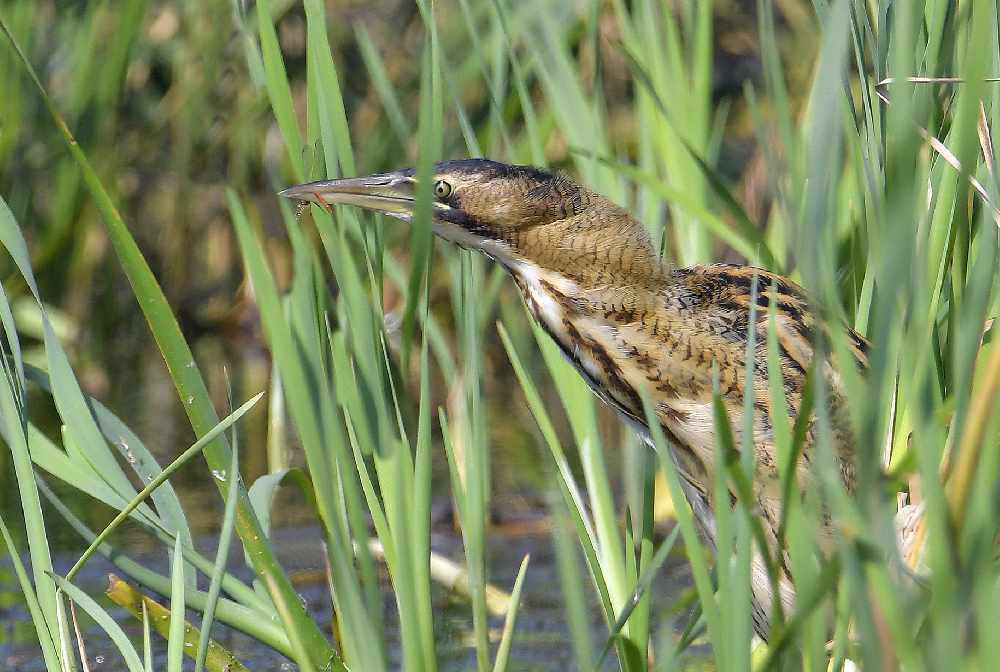
The unique sound of booming bitterns can be heard at RSPB Leighton Moss in Silverdale once again following new methods of managing the nature reserve’s vast reedbeds
After an absence of almost a decade, the elusive birds returned to nest in 2018 and have continued to go from strength to strength, with up to six males birds being heard so far this spring.
An unusual cousin of the more familiar grey heron, bitterns rely on reedbeds to live in - a now rare habitat in the UK, with Leighton Moss being the largest one in North West England.
Jarrod Sneyd, Site Manager at Leighton Moss said: “Leighton Moss has always been synonymous with bitterns but they’d stopped breeding here by the late 2000s. The reasons why are complex. Leighton Moss is an old reedbed and aging reedbed tends to be quite dry. Bitterns like young, wet reedbeds where they can catch fish, so RSPB staff and volunteers spend a lot of time managing the site in a way that halts its aging process and creates the conditions that bitterns and lots of other wildlife need to thrive.”
In the late 1990s bitterns were almost wiped out in the UK, due to the loss of the reedbed habitat on which they depend. At that time Leighton Moss was one of only a few sites in the country where bitterns were clinging on. Just eleven booming male bitterns were left, with three of those at Leighton Moss and the majority of the others in East Anglia.
Since then, the RSPB and other nature conservation organisations have been working hard to save the species and it has been successful, with around 200 booming males now recorded at various sites across the country. Bittern populations are monitored by recording the number of ‘booming’ males. Booming is the unusual song of the male birds, a deep sound similar to blowing over the top of a glass bottle. When fully booming, a male can be heard for several kilometres!
Jarrod added: “After the thrill of having three booming males on the reserve last year we were absolutely delighted to hear at least six different males this spring! It really goes to show that all the hard work that we have done, and continue to do, is really paying off for this most amazing of birds.”
Visitors to the site may hear the bizarre sound of bitterns almost anywhere along the popular reserve’s paths while they may also spot a variety of the site’s other special wildlife such as breeding marsh harriers, otters and bearded tits.
For more information on wildlife sightings, facilities and opening times, visit www.rspb.org.uk/leightonmoss or follow RSPB Leighton Moss on Facebook and Twitter.



 Council teams go head-to-head to pull seven-and-a-half tonne truck in Lancaster
Council teams go head-to-head to pull seven-and-a-half tonne truck in Lancaster
 Morecambe artist returns to exhibit at 'Olympics of art world' in Venice
Morecambe artist returns to exhibit at 'Olympics of art world' in Venice
 Appeal after break-in attempt at hospice shop in Morecambe
Appeal after break-in attempt at hospice shop in Morecambe
 'Increasingly concerned' police renew appeal to find man who went missing in Morecambe
'Increasingly concerned' police renew appeal to find man who went missing in Morecambe
 West End Festival announces return in 2024
West End Festival announces return in 2024
 INTERVIEW: Drummer shares his music memories from Simply Red stardom to glorious Morecambe sunsets
INTERVIEW: Drummer shares his music memories from Simply Red stardom to glorious Morecambe sunsets
 Celebrate Earth Day in Lancaster district
Celebrate Earth Day in Lancaster district
 INTERVIEW: How the Prince's Trust is helping young people in Lancaster and Morecambe
INTERVIEW: How the Prince's Trust is helping young people in Lancaster and Morecambe
 Woman rescued near Morecambe Promenade as lifeboat called out three times in a day
Woman rescued near Morecambe Promenade as lifeboat called out three times in a day
 Firefighters called to house fire in Morecambe
Firefighters called to house fire in Morecambe
 Human remains found near Silverdale included 'skull believed to be male'
Human remains found near Silverdale included 'skull believed to be male'
 Lancaster City Council secures more than £750,000 from government towards Supa Skips clean up
Lancaster City Council secures more than £750,000 from government towards Supa Skips clean up
 Man suffers serious facial injury in ‘vicious attack’ by man ‘in possession of knuckledusters’
Man suffers serious facial injury in ‘vicious attack’ by man ‘in possession of knuckledusters’
 INTERVIEW: Morecambe antiques dealer moves to new home in Lancaster city centre
INTERVIEW: Morecambe antiques dealer moves to new home in Lancaster city centre
 Morecambe Winter Gardens advertise new paid roles for ‘People’s Palace’
Morecambe Winter Gardens advertise new paid roles for ‘People’s Palace’
 Morecambe and Lancaster arts groups receive award nomination for school vaccination project
Morecambe and Lancaster arts groups receive award nomination for school vaccination project
 Morecambe projects helping young adults with mental health receive a cash boost
Morecambe projects helping young adults with mental health receive a cash boost
 Crews extinguish lorry fire in Morecambe
Crews extinguish lorry fire in Morecambe
 Life of dedicated scout leader will be celebrated in Morecambe
Life of dedicated scout leader will be celebrated in Morecambe
 Event announced for residents to help create exhibits for new £100m Eden Project Morecambe
Event announced for residents to help create exhibits for new £100m Eden Project Morecambe




